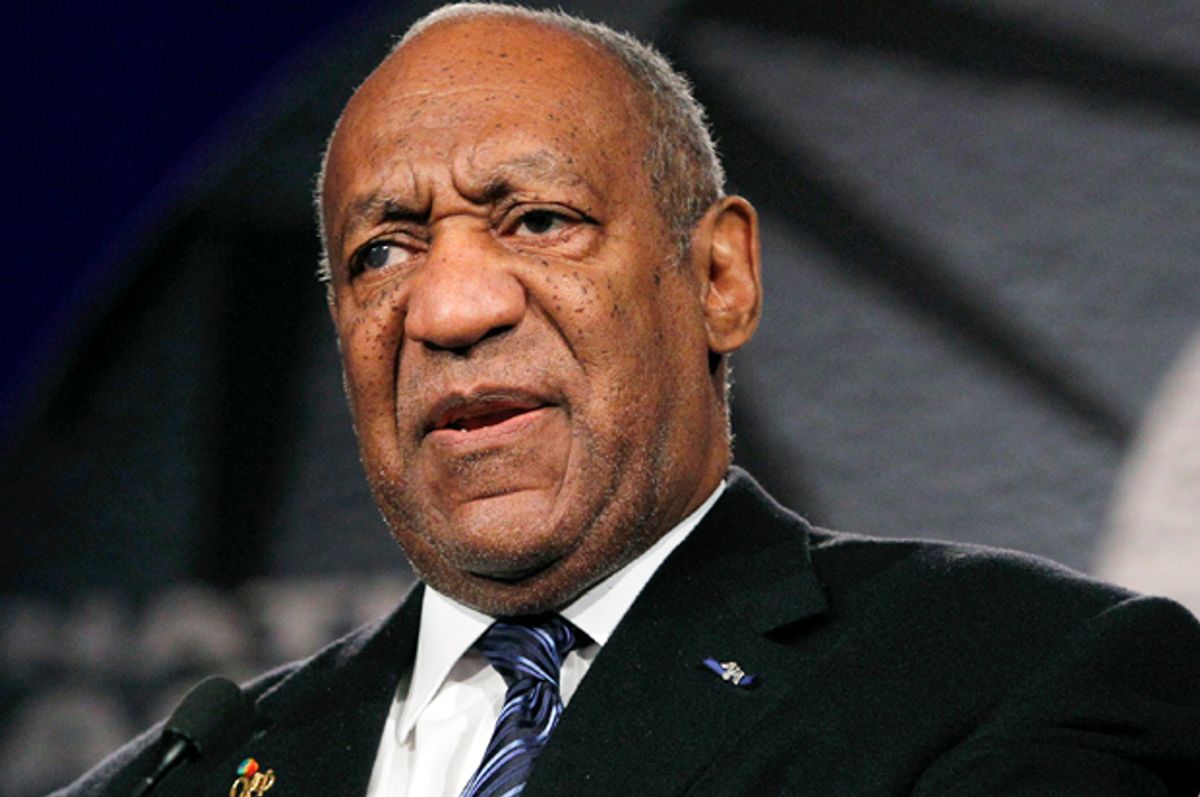I wrote about Bill Cosby a lot last week. Some would say (and have said) that I’ve written about Cosby too much. I have tried to watch, as closely as I can, the backlash unfold over decades-old rape allegations against the comedian, partly because this is the first time this particular story is being told in this manner and volume.
As damning new footage from the Associated Press and recent efforts by Cosby’s attorney to intimidate reporters would indicate, that’s because the star has done his best to bury the allegations for years. But now that the allegations are out in the open, they’re out in full force; everything is on the table. And everything is on the table partly because the media has finally decided to put it there.
16 women, all of whom have zero civil recourse, have said that Bill Cosby raped them. They have told similar stories, and some of them have been telling these stories for years. Not believing them, Ta-Nehisi Coates writes for the Atlantic, would require one to “conjure a vast conspiracy, created to bring down one man, seemingly just out of spite.”
I am not capable of that sort of conjuration, and it seems that many others in the media no longer are, either. That is one reason why these stories about Cosby are appearing everywhere now, and in such great quantities. Printing the facts—that these numerous allegations exist, even if they are “just” allegations; that Cosby has continually refused to respond to them, and seemingly done everything in his once-vast power to prevent them from seeing the light of day—seems to be the only way through this nebulous process of figuring out what happened. It might be the only way of finding justice.
There has been a change in the ethics of covering the Cosby case, but it’s difficult to say when that happened. It seems that, for years, it was considered irresponsible to publicize these rape allegations—because without a preponderance of evidence, or any evidence at all, publishing such claims could have ended the career of a beloved and potentially innocent man. But what we knew about the case ten years ago is still much of what we know about it now: 13 women, including Barbara Bowman and Tamara Green, joined in a lawsuit brought forth by Andrea Constand, which accused Cosby of rape. He settled out of court for an undisclosed amount of money in 2006.
Were we not curious about those circumstances then? Would it really have been so irresponsible not to report that information?
Now, we’ve reached a point where it would be irresponsible not to publicize the allegations against Cosby. It would be just as irresponsible not to share news of his efforts to avoid talking about the accusations, which is exactly what the Associated Press did with its recent interview footage for weeks before finally making the tape public.
Why did the responsibility change? Is it simply that we are at a moment in time, right now, when accusers’ stories suddenly seem more believable? (The outcomes of other alleged sexual assault cases would indicate otherwise.) Or, is it because with this particular case, we’ve reached a critical mass of accusers whose stories we can no longer ignore? Is 13 the magic number? 14? 15? What about the multiple women who accused Jian Ghomeshi of brutalizing their bodies as well? Are these stories finally taking hold because in both cases, we’ve reached the point where it’s almost completely rationally impossible not to believe, let alone listen to, these women?
I don’t think the media’s ongoing response to the Cosby rape allegations indicates a larger shift in journalistic ethics or responsibility. It has been our responsibility to make these stories known since at least 2004, when they were publicized for the first time. And since then the story has gotten worse for Cosby. More accusers have come forward, and his own -- silent -- response has been wanting.
So many women are sharing their stories. And Cosby keeps refusing to answer anyone about anything.
The media is finally fulfilling a duty it already had—to report facts, ask questions and try to find answers. In lieu of answers, we can present all of what we know and learn from all of what we allowed to stay hidden.
It's obviously not impossible for an accusation to be false -- Kobe Bryant was acquitted of rape; Tawana Brawley's accusations were later discredited -- and no one wants to ruin another person's reputation wrongly or prematurely. Clearly people -- including many in the media -- were concerned that this story looked bad for a beloved American icon. But that can’t matter now, not when so much doubt has been erased, when 16 -- sixteen! -- women are asking to have this story told, and when the media’s focus on the case might be the only justice they ever receive.
The media can’t say for certain that Bill Cosby ever raped anybody; aside from compelling testimony, we don’t have smoking gun recordings to prove it, and neither may his accusers. But that doesn’t mean that we cannot believe them. We are all free to draw our own conclusions about Cosby’s guilt or innocence, and about the truth of these women’s words. But we can only do that with a full account of the story unfolding before us—not just the parts of it one man wants us to hear.
Updated, 11/24, 10:30 a.m. Due to an editing error, this post initially indicated that Kobe Bryant had been acquitted of rape. This is not correct; the matter was settled out of court with the accuser choosing not to testify in the criminal case. The post has been updated accordingly.

Shares